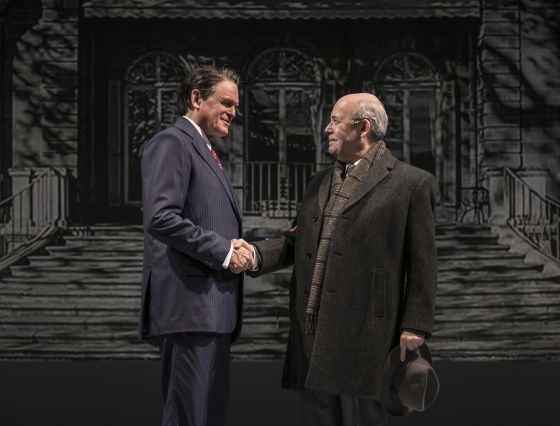
For as long as historical dramas have been written, their authors have struggled with the task of conveying the context of the events depicted to audiences who may be too young to remember them, too old to remember them accurately, or weren't paying attention while they transpired—all within the increasingly abbreviated performance time dictated by the fashion of the day. Narrative devices for accomplishing this orientation in 2018 mandate the inclusion of one or more scenes in which a) the opposing champions dismiss bystanders to grapple one-on-one with an honesty born of secrecy, b) their subordinates huddle around a conference table or swarm around a messenger and c) their female consorts exchange veiled insults, and—most important—each hero is assigned a sidekick to translate the lofty issues into earthy observations couched in a vernacular replete with pop-culture references immediately comprehended by rubes like us. In Rogelio Martinez's Blind Date, the history covers a meeting held in the late autumn of 1985, the heroes are United States President Ronald Reagan and Soviet Union General Secretary Mikhail Gorbachev, the issue is the nuclear arms race, and the sidekicks are U.S. Secretary of State George Schulz and Soviet Minister of Foreign Affairs Eduard Shevardnadze. The language employed in the proceedings is sprinkled with phrases lifted from cinema classics, reflecting Reagan's previous occupation as a Hollywood film actor, as well as skirmishes over funny cocktail names, sartorial protocols and astrological advice. The visual diversity evidenced in director Robert Falls's casting likewise ensures the array of balding gray-suited males dominating the stage picture remaining distinct from one another. This physical contrast serves Jim Ortlieb and Steve Pickering well in the roles of Shultz and Shevardnadze, who swap wry commentary on their respective bosses—played with boyish affability by Rob Riley and William Dick (bellicosity being the province of their wives, as represented by Deanna Dunagan and Mary Beth Fisher)—with the nuanced delivery of tournament-doubles teammates. However much we may chuckle at recognizing a quotation's provenance to be, say, Marty McFly, rather than Plato or Seneca, there is wisdom to be found in screenplays, too, as the final speech from “The Day the Earth Stood Still” amply illustrates when invoked at just the right juncture to remind us of the significant stakes in this microcosmic match.
